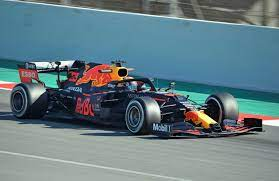Science & Technology
100% Sustainable Fuel for Formula 1
- 12 Apr 2021
- 8 min read
Why in News
Recently, the Fédération Internationale de l’Automobile (FIA) has announced the first barrels of 100% sustainable fuel, made from bio waste and developed to stringent F1(Formula One) specifications, have been delivered to Power Unit manufacturers.
- FIA announced its intent to make F1 carbon neutral by 2030 and to have sustainable races by 2025.
- Formula One, also called F1 in short, is an international auto racing sport. F1 cars are the fastest regulated road-course racing cars in the world.
- F1 is the highest level of single-seat, open-wheel and open-cockpit professional motor racing contest.
- Formula One racing is governed and sanctioned by a world body called the Fédération Internationale de l'Automobile (FIA) or the International Automobile Federation. The name ‘Formula’ comes from the set of rules that the participating cars and drivers must follow.
Key Points
- F1 Current Carbon Footprint:
- Direct Effect:
- F1’s driving activities produce approximately 2,56,000 tonnes of carbon dioxide per year, which is the equivalent to powering roughly 30,000 houses in the UK over the same time period.
- Indirect Effect:
- The main issue is not the cars themselves, which accounted for only 0.7% of the sport’s emissions in 2019, but the logistics of transporting teams and equipment across the globe.
- In 2019, road, sea and air logistics for equipment transportation accounted for 45% of F1’s emissions with business travel for teams contributing an additional 27.7%.
- Rounding up the list, factories and facilities servicing the sport represent 19.3% of emissions, and event operations, another 7.3%.
- Uncounted Emission:
- The 2,56,000 number doesn’t even factor in the impact of fans, millions of whom require transportation and accommodation on and around the race weekend.
- If one were to include the emissions generated by fans, the total carbon footprint of F1 catapults to approximately 1.9 million tonnes of carbon dioxide generated by the sport annually.
- Direct Effect:
- 100% Sustainable Fuels:
- Background:
- One of the most high-profile ways in which F1 plans to reduce its environmental impact is through the continued evolution of energy-efficient engines.
- Starting from 1989 when the FIA Alternative Fuel Commission was formed, F1 has committed to a number of initiatives designed to improve engine efficiency, with the most notable being its global fuel economy initiative in 2007 which aims to reduce fuel consumption by 50% across the competition.
- In 2020, the FIA announced that it had developed a 100% sustainable fuel and that engine manufacturers were already in the process of testing it, intending to start using it by 2026.
- About:
- A 100% sustainable fuel essentially represents the third generation and most advanced iteration of biofuels, which typically are made from by-products of industrial or agricultural waste.
- F1 cars already use biofuels but current regulations only mandate that the fuel include 5.75% of bio-components.
- In 2022 that number will increase to 10% and by 2025, when new power units are proposed to enter the competition, the FIA hopes to transition completely to 100% advanced sustainable fuels.
- Background:
Biofuels
- About:
- Any hydrocarbon fuel that is produced from an organic matter (living or once living material) in a short period of time (days, weeks, or even months) is considered a biofuel.
- Biofuels may be solid, liquid or gaseous in nature.
- Solid: Wood, dried plant material, and manure
- Liquid: Bioethanol and Biodiesel
- Gaseous: Biogas
- These can be used to replace or can be used in addition to diesel, petrol or other fossil fuels for transport, stationary, portable and other applications. Also, they can be used to generate heat and electricity.
- Categories of Biofuels:
- First generation biofuels:
- These are made from food sources such as sugar, starch, vegetable oil, or animal fats using conventional technology.
- Common first-generation biofuels include Bioalcohols, Biodiesel, Vegetable oil, Bioethers, Biogas.
- Second generation biofuels:
- These are produced from non-food crops or portions of food crops that are not edible and considered as wastes, e.g. stems, husks, wood chips, and fruit skins and peeling.
- Thermochemical reactions or biochemical conversion processes are used for producing such fuels.
- Examples: Cellulose ethanol and biodiesel.
- Third generation biofuels:
- These are produced from micro-organisms like algae.
- Example: Butanol
- Micro-organisms like algae can be grown using land and water unsuitable for food production, therefore reducing the strain on already depleted water sources.
- These are produced from micro-organisms like algae.
- Fourth Generation Biofuels:
- In the production of these fuels, crops that are genetically engineered to take in high amounts of carbon are grown and harvested as biomass.
- The crops are then converted into fuel using second generation techniques.
- The fuel is pre-combusted and the carbon is captured. Then the carbon is geo-sequestered, meaning that the carbon is stored in depleted oil or gas fields or in unmineable coal seams.
- Some of these fuels are considered as carbon negative as their production pulls out carbon from the environment.
- First generation biofuels:
- India’s Related Initiatives:
- E20 Fuel: The Indian government has invited public comments for introducing adoption of E20 fuel (a blend of 20% ethanol with gasoline).
- Pradhan Mantri JI-VAN Yojana, 2019: The objective of the scheme is to create an ecosystem for setting up commercial projects and to boost research and development in the 2G Ethanol sector.
- Reduction in GST: The Government has also reduced GST on ethanol for blending in fuel from 18% to 5%.
- National Biofuel Policy 2018: The Policy categorises biofuels as "Basic Biofuels'' viz. First Generation (1G) bioethanol & biodiesel and "Advanced Biofuels'' - Second Generation (2G) ethanol, Municipal Solid Waste (MSW) to drop-in fuels, Third Generation (3G) biofuels, bio-CNG etc. to enable extension of appropriate financial and fiscal incentives under each category.





